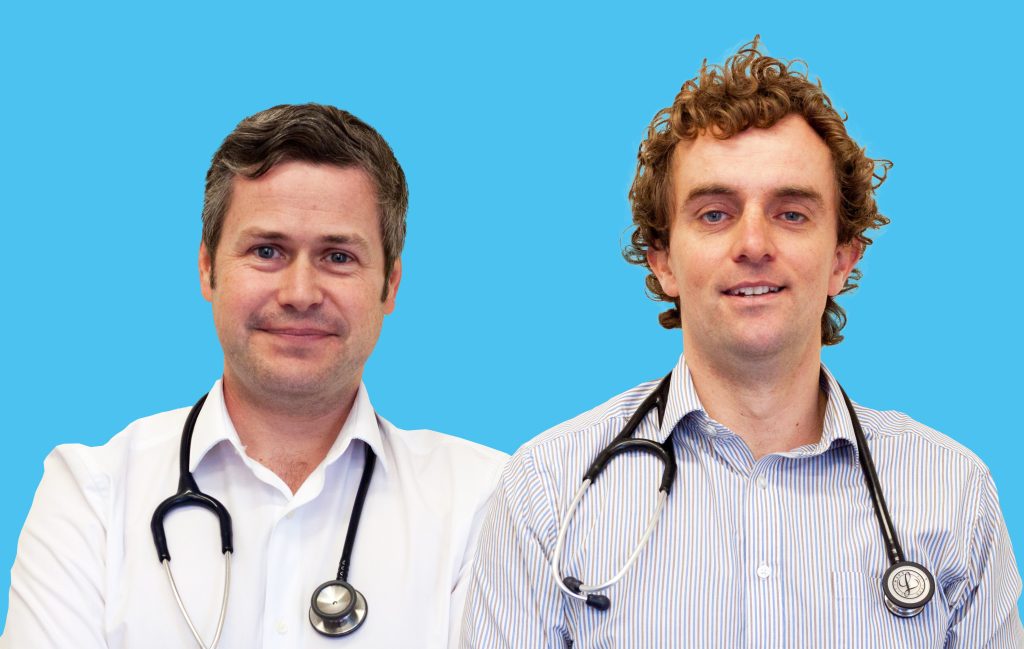
Dr Tommy Perkins (pictured right, above) is a GP. In 2019 he started Medics’ Money, alongside Dr Ed Cantelo, who is a GP and also a Chartered Accountant and Chartered Tax Advisor. Medics’ Money aims to empower doctors to make better financial decisions, by providing free guides and tools, and helping doctors find specialist medical Accountants and Independent Financial Advisers.
Tommy kindly answered our questions about the financial challenges that doctors face, and what they can do to take care of their financial health.
What inspired you and Ed to set up Medics’ Money?
I came from a working-class family, and I left medical school with crippling debts and no idea how manage my finances. I received no financial education at school, or at medical school. My situation forced me to educate myself on how to manage my money. I learned to budget, save, and pay off bad debts like credit cards. I also saved thousands of pounds by claiming a tax rebate for the significant fees doctors have to pay – like GMC, Royal College and exam fees.
I started helping colleagues with their finances, and while doing an A&E Locum, I met Ed. He is not only a doctor, but also a Chartered Accountant and Tax Adviser. We joined forces with the aim of helping to educate and empower doctors to make better financial decisions.
Are there any financial issues or pitfalls that are specific to doctors?
Because doctors receive little or no financial education, we can make financial mistakes that cost us thousands. Even worse, our trusting nature and financial naivety can leave us susceptible to receiving bad advice from advisers who don’t understand the complexities of doctors’ finances, like the NHS Pension.
This is why we have curated a list of Medics’ Money approved advisers, and we’ve matched over 10,000 doctors to an expert financial adviser, verified by us with reviews from real doctors.
If a doctor is looking to improve their “financial health”, where should they start?
Our free e-book, What medical school didn’t teach us about money, helps you build a simple financial plan to start improving your finances. We’ll teach you how to spend less than you earn by setting a budget – generating spare money each month, which can be used to pay off bad debt like credit cards, and invest for your future.
We also offer a free guide to claiming a tax rebate on those expensive career fees I mentioned earlier. It could save you thousands of pounds.
Medicine is a demanding job. Do you have any financial tips for doctors who are extremely busy or feeling overwhelmed?
Yes – at the start of my career I was in financial difficulty, and it was overwhelming. I felt like I was living pay-cheque to pay-cheque, barely able to keep up my debt repayments. If you’re in the same situation, then remember: you are not alone, and organisations like the RMBF can help you.
It took some effort to sort out my finances, but everyone can do it. By developing a few key financial habits – like spending less than you earn, and buying assets, not liabilities – slowly, over time things will get better. But if you do nothing, your finances won’t improve automatically.
What could medical employers to do improve their employees’ financial health? What about medical schools?
I think financial education should be on the curriculum. A sponsored talk from a poorly-trained financial salesperson, whose aim is to earn commission from final-year medical students, is not financial education. Instead, medical schools should promote holistic, unbiased financial education.
You had quite a serious injury recently – has that made you worry for the future financially?
Yes, I chopped my thumb, index and middle finger off and haven’t been able to work as a doctor for over six months. Fortunately, when building my own financial plan, I got insurance to protect my (and my family’s) future, and so thankfully I have no financial worries.
But if you don’t have insurance and you think NHS sick pay will be enough, or you bought an insurance policy years ago from a restricted financial adviser, you need to read our guide to income protection insurance. You should consider saving into an emergency fund, too.
What are your future plans for Medics’ Money?
Our mission is help as many doctors as possible make better financial decisions. We have our website, our tax guide, our e-book and our podcast, and we’ve recently joined YouTube. We’re also starting to help other health professionals like nurses and dentists.
The Medics’ Money website offers free resources, including downloadable guides, a tool to find expert help near you, and a tax rebate calculator.
They also have a free podcast – the RMBF’s Joe Meredith appeared on a recent episode, talking to Tommy about financial support for struggling doctors.
If you are struggling financially due to illness, injury, disability or bereavement, don’t forget you could be eligible for financial help from the RMBF.

